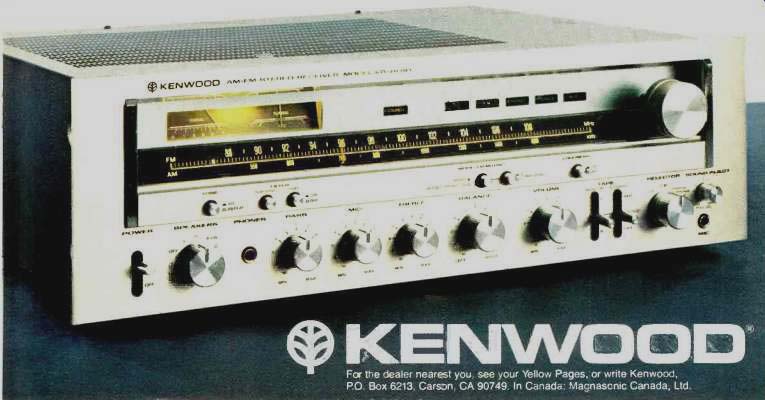Power-hungry speakers have finally met their match.

If you're enthusiastic about today's less-efficient, super-accurate speaker systems, you know you need a very efficient, super-power receiver to drive them.
And if your ears are good enough, you know the value of lots of power to handle critical musical passages with any speaker system.
That's why we created the new KR-8010. With 125 watts per channel, minimum RMS both channels driven at 8 ohms, from 20 to 20,000 Hz with no more than 0.03% total harmonic distortion, you've got all the power you really need.
But more important, the KR-8010 gives you an extremely clean, low-distortion signal at the same time.
For example, the signal-to-noise ratio through the phono input is the best you'll find on any receiver (90 dB). Its overall frequency response is matched precisely to the RIAA curve ± 0.2 dB. And the tuner delivers sensitivity and selectivity that you'll really appreciate in signal-crowded cities.
To shape that signal into music, the KR-8010 offers a full range of front-panel controls usually found only in esoteric separates and recording studios. Like tape dubbing while listening to another source. And dual FM muting levels. MIC input and fade control.
Bass, treble and midrange tone controls. And more.
The point is simply this: At $675.00* the KR-8010 is made for the listener who demands as much from his receiver as he does from his speakers.
Next time you're at your Kenwood dealer listen to your favorite speaker with the KR-8010.
We think that your ears will finally meet their match.
*Nationally advertised value. Actual prices are established by Kenwood dealers.
(Source: Audio magazine, Nov. 1978)
Also see:
Kenwood KR-7600 receiver (Oct. 1976)
= = = =